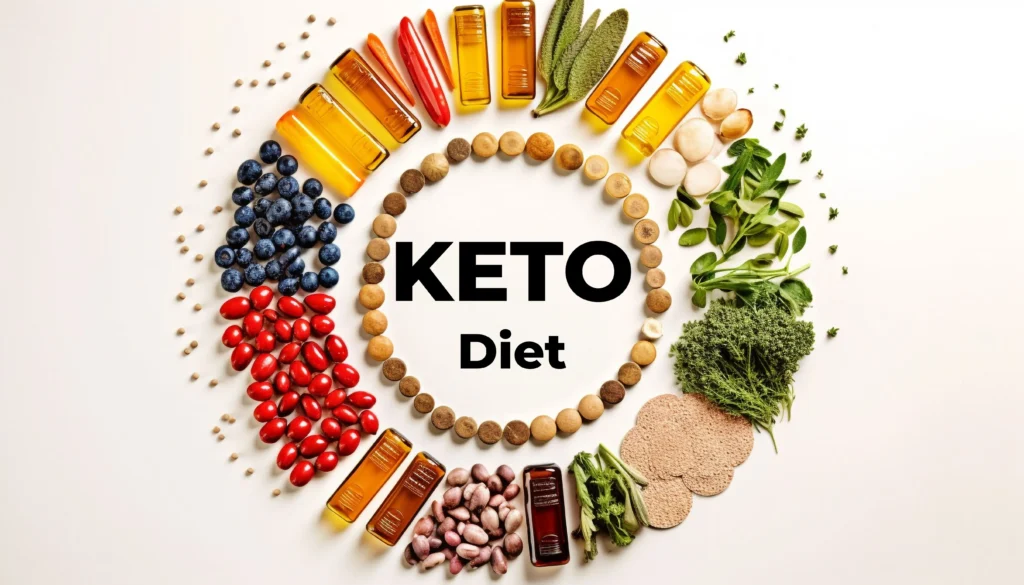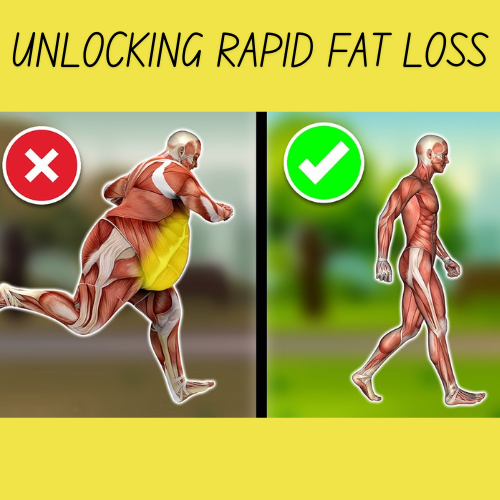Before delving into specific strategies for rapid weight loss, it’s essential to understand the fundamental principles that govern the process. Weight loss occurs when the body expends more calories than it consumes, creating a caloric deficit. This deficit prompts the body to tap into stored fat reserves for energy, leading to a reduction in body weight over time. To achieve rapid weight loss, it’s crucial to optimize factors such as metabolism, nutrient intake, hydration, sleep, and stress management, while implementing targeted strategies for fat burning and lean muscle preservation.
Metabolism plays a central role in determining how efficiently the body burns calories and manages energy expenditure. By enhancing metabolic function through targeted lifestyle interventions, individuals can accelerate fat loss and maximize their weight loss efforts. Strategies to boost metabolism include engaging in regular cardiovascular exercise, incorporating high-intensity interval training (HIIT) workouts, and prioritizing strength training exercises to build lean muscle mass. Additionally, consuming thermogenic foods and beverages, such as green tea, chili peppers, and coffee, can temporarily increase metabolic rate and promote fat burning.
Caloric Deficit: The Foundation of Rapid Lose Weight
At the heart of any successful weight loss regimen lies the principle of maintaining a caloric deficit. This means consuming fewer calories than the body expends on a daily basis, leading to a net loss of stored body fat over time. To create a caloric deficit, individuals can adjust their dietary intake by reducing portion sizes, choosing nutrient-dense foods, and limiting consumption of high-calorie, processed foods. Additionally, increasing physical activity levels through regular exercise and structured workouts can further enhance calorie expenditure and accelerate weight loss progress.
Exercise: A Cornerstone of Rapid Weight Loss
Regular exercise is essential for promoting fat burning, preserving lean muscle mass, and optimizing overall health and well-being. Incorporating a combination of cardiovascular exercise, strength training, and high-intensity interval training (HIIT) can help individuals achieve rapid weight loss results while improving cardiovascular fitness and muscular strength. Cardiovascular exercises, such as running, cycling, swimming, or brisk walking, increase calorie expenditure and promote fat loss. Meanwhile, strength training exercises, such as weightlifting or bodyweight exercises, help build lean muscle mass and boost metabolism, leading to long-term fat burning and weight management.
Nutrition: The Foundation of a Healthy Weight Loss Diet
In addition to exercise, proper nutrition plays a pivotal role in achieving rapid and sustainable weight loss. Adopting a balanced diet rich in macronutrients (carbohydrates, proteins, and fats) and micronutrients (vitamins and minerals) is essential for supporting metabolic function, promoting satiety, and optimizing energy levels. Incorporating lean protein sources, such as poultry, fish, tofu, legumes, and eggs, can help preserve lean muscle mass and promote feelings of fullness. Similarly, consuming complex carbohydrates, such as whole grains, fruits, and vegetables, provides sustained energy while promoting digestive health and nutrient absorption.
Healthy Eating Habits: Tips for Success
In addition to focusing on nutrient-dense foods, adopting healthy eating habits can further support rapid weight loss and long-term success. Strategies for promoting healthy eating include mindful eating, portion control, meal planning, and staying hydrated. Mindful eating involves paying attention to hunger cues, savoring each bite, and avoiding distractions during meals, leading to increased satisfaction and reduced calorie intake. Portion control involves measuring serving sizes, avoiding oversized portions, and being mindful of calorie-dense foods.
Hydration: The Importance of Water Intake for Weight Loss
Proper hydration is essential for supporting metabolic function, promoting digestion, and facilitating cellular processes within the body. Drinking an adequate amount of water throughout the day can help curb hunger, promote satiety, and prevent overeating. Additionally, staying hydrated can support exercise performance, optimize nutrient absorption, and promote overall health and well-being. Aim to drink at least eight glasses of water per day, and consider incorporating hydrating foods, such as fruits and vegetables, into your diet.
Sleep: The Role of Quality Sleep in Weight Loss
Quality sleep is crucial for supporting overall health, cognitive function, and weight loss efforts. During sleep, the body undergoes essential processes such as tissue repair, hormone regulation, and metabolism regulation. Inadequate sleep can disrupt hormonal balance, increase appetite, and contribute to weight gain and metabolic dysfunction. To optimize sleep quality and promote weight loss, aim for seven to nine hours of uninterrupted sleep per night, establish a consistent sleep schedule, create a relaxing bedtime routine, and minimize exposure to electronic devices and stimulating activities before bedtime.
Stress Management: Strategies for Reducing Stress and Promoting Weight Loss
Chronic stress can have detrimental effects on physical and emotional well-being, contributing to weight gain, poor dietary choices, and disrupted sleep patterns. By implementing effective stress management techniques, individuals can mitigate the negative impact of stress on their health and well-being while promoting weight loss and overall vitality. Strategies for reducing stress include mindfulness meditation, deep breathing exercises, yoga, tai chi, progressive muscle relaxation, and spending time in nature. Additionally, engaging in enjoyable activities, practicing gratitude, and seeking social support can help foster resilience and promote emotional well-being.
Fasting: Exploring Intermittent Fasting as a Weight Loss Strategy
Intermittent fasting has gained popularity as a weight loss strategy in recent years, with proponents touting its potential benefits for fat burning, metabolic health, and longevity. Intermittent fasting involves cycling between periods of eating and fasting, typically on a daily or weekly basis. Common methods of intermittent fasting include the 16/8 method, where individuals fast for 16 hours and eat during an 8-hour window, and the 5:2 method, where individuals consume a reduced calorie intake on two non-consecutive days of the week. While intermittent fasting may offer certain metabolic benefits and promote weight loss, it may not be suitable for everyone and should be approached with caution, especially for individuals with underlying health conditions or disordered eating patterns.
Supplements: Exploring the Role of Dietary Supplements in Weight Loss
While proper nutrition should always be prioritized as the foundation of a healthy weight loss diet, certain dietary supplements may offer additional support for fat burning, metabolism, and overall health. Common supplements used for weight loss include caffeine, green tea extract, conjugated linoleic acid (CLA), forskolin, and garcinia cambogia. These supplements are purported to increase energy expenditure, enhance fat metabolism, and suppress appetite, although research on their efficacy and safety remains mixed. Before incorporating any dietary supplement into your regimen, it’s important to consult with a healthcare professional to ensure safety and effectiveness.
Conclusion
In conclusion, achieving rapid weight loss requires a multifaceted approach that addresses key factors such as metabolism, caloric deficit, exercise, nutrition




